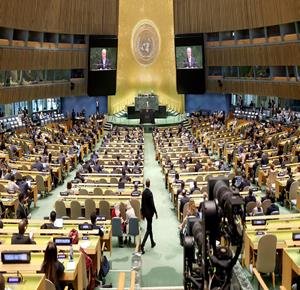Introduction to the Conference
The New York Conference, held on May 15, 2025, represents a pivotal moment in the ongoing endeavor to address the long-standing Israeli-Palestinian conflict. Organized by a coalition of influential parties, notably Saudi Arabia, France, and the United Nations, the conference aims to initiate a renewed peace process that seeks to bridge the divides between Israelis and Palestinians. The organizers are driven by a shared recognition of the urgent need for a resolution that has been elusive for decades. Their diverse backgrounds and motivations offer a compelling backdrop to this international effort.
The historical context of the Israeli-Palestinian conflict is marked by a series of complex events that have shaped the landscape of regional politics. For decades, disputes over land, national identity, and mutual recognition have fueled tensions, resulting in cycles of violence and diplomatic stagnation. The necessity for international involvement in fostering peace has never been more evident, as local approaches have often been hampered by entrenched positions and an inability to engage in constructive dialogue. As numerous attempts at mediation have faltered, the New York Conference emerges as a potentially transformative initiative, aiming to bring fresh perspectives and cooperative energy to the peace process.
Saudi Arabia’s participation signifies its aspiration to play a leadership role in the Arab world and to support a sustainable solution that respects Palestinian rights. France, with its historical ties to both Israel and the Palestinian territories, seeks to renew its commitment to multilateral diplomacy, underlining the importance of collaborative efforts in achieving peace. Meanwhile, the United Nations remains a key player due to its mandate to promote international peace and security, as well as its recognition of the dire humanitarian conditions resulting from the ongoing conflict. Together, these organizers present a united front with the intent to stimulate an inclusive dialogue for reconciliation and stability in the region.
Roles and Challenges of Key Organizers
The roles of key organizers in the 2025 New York Conference are crucial to understanding the dynamics of international efforts aimed at resolving the Israeli-Palestinian conflict. Saudi Arabia, France, and the United Nations emerge as central players, each bringing unique rationales and challenges to the negotiation table.
Saudi Arabia positions itself as a leading Muslim power, leveraging its influence to foster dialogue and cooperation among Arab nations. Its efforts to mediate in the peace process are bolstered by its strategic agreements within the region. However, domestic challenges, such as socio-economic reform agendas and public opinion, often complicate its ability to act decisively. Additionally, regional dynamics, including relations with Iran and the Gulf states, further add layers of complexity to Saudi Arabia’s mediating role, making it imperative for the Kingdom to navigate carefully between various interests.
France’s historical commitment to peace and stability in the Middle East reflects its diplomatic aspirations to promote international law and human rights. Through this lens, France seeks to reaffirm its role within the European Union as a key advocate for peace. Nevertheless, the complexities it faces within the EU structure, notably differing member state perspectives on foreign policy and economic implications, challenge France’s ability to present a unified stance. This fragmentation can hinder concerted diplomatic efforts, making collaborative action more challenging.
The United Nations, while recognized as a vital player in international diplomacy, encounters significant limitations during the conference. Internal divisions among member states often lead to political stalemates that can undermine effective decision-making. Additionally, the diminished authority of UN resolutions in the context of global geopolitics raises questions about the organization’s ability to enforce peace initiatives. The presence of conflicting national interests further complicates the UN’s efforts to mediate effectively, hindering its previously significant role in addressing the Israeli-Palestinian conflict.
Conference Outcomes and Failures
The 2025 New York Conference aimed to address the longstanding Israeli-Palestinian conflict, seeking to foster meaningful dialogue and generate pathways for peace. However, the outcomes of the conference raised significant concerns, as the proceedings largely devolved into a series of public relations maneuvers rather than substantive negotiations. Despite the call for a renewed commitment to peace, the lack of binding resolutions inhibited any transformative impact on the delicate situation in the region.
An emphasis was placed on humanitarian aspects during the conference, highlighting the ongoing suffering faced by Palestinians. While acknowledging humanitarian crises is indeed important, many critics argue that this focus overshadowed the critical need for political solutions. The absence of practical advancements in peace negotiations was particularly notable, as discussions surrounding tangible agreements were overshadowed by more generalized humanitarian appeals. This approach has left many concluding that the conference failed to capitalize on its potential as a catalyst for real change.
<pmoreover, a="" actions="" an="" and="" as="" backing="" conference="" consequently,="" contributed="" credible="" effectively="" efforts="" endorsement="" failure="" gravitas="" hindered="" initiative="" initiatives="" insufficient="" international="" into="" key="" lack="" lead="" lend="" leverage="" may="" necessary="" of="" often="" or="" outcome.
The confluence of these factors has perpetuated the enduring status quo, leaving many observers disheartened by the apparent stagnation in progress. As the situation continues to evolve, it remains imperative for future conferences to prioritize concrete political frameworks, ensuring that dialogues can transition into actionable resolutions, which are essential for long-lasting peace in the region.
Lessons Learned and Future Implications
The 2025 New York Conference has emerged as a significant event in the ongoing quest for Israeli-Palestinian peace, shedding light on the intricate dynamics of international diplomacy. One of the primary lessons garnered from this gathering is the imperative for political will among key stakeholders. Despite the noble intentions behind peace initiatives, fragmented interests often hinder collaborative efforts. The conference illustrated that for any diplomatic engagement to succeed, participants must prioritize unity over divergent agendas.
Another crucial insight pertains to the consistency of mediation efforts. The fluctuating commitment levels from international actors can erode trust and diminish the chances for lasting solutions. This inconsistency underscores the importance of having sustained and coherent mediatory actions, which facilitate a constructive dialogue environment. When mediators exhibit unwavering dedication, they establish a framework within which both parties can engage more meaningfully, potentially leading to breakthroughs in negotiations.
Furthermore, stakeholder alignment is vital for any successful peace initiative. The 2025 Conference highlighted the stark differences among the interests of various international players involved in the Israeli-Palestinian conflict. Achieving coherence in diplomatic strategies requires collaboration not only among mediating nations but also with regional players, civil society, and grassroots movements. Such an integrated approach fosters trust and demonstrates a collective commitment to peace rather than individual gains.
Looking ahead, the lessons from the 2025 New York Conference prompt deep reflections on the future of peace processes involving Israel and Palestine. The need for a more unified international approach becomes increasingly salient, suggesting that without cohesive strategies and a shared vision, the path to sustainable peace remains fraught with challenges. These insights signal a call to action for all engaged in the peace efforts, urging them to consider how best to align their strategies to facilitate genuine dialogue and cooperation moving forward.



An impressive share, I just given this onto a colleague who was doing somewhat evaluation on this. And he in reality purchased me breakfast as a result of I discovered it for him.. smile. So let me reword that: Thnx for the deal with! However yeah Thnkx for spending the time to discuss this, I feel strongly about it and love studying extra on this topic. If attainable, as you grow to be expertise, would you thoughts updating your blog with extra particulars? It is extremely helpful for me. Massive thumb up for this blog post!